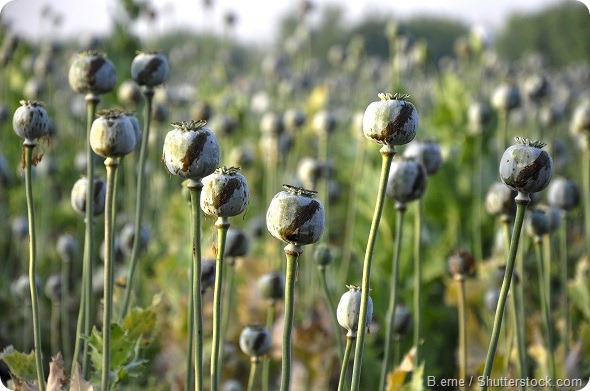Researchers at Stanford University have genetically engineered yeast so it produces hydrocodone, a semi-synthetic opioid analgesic used in the United States for relief of moderate to severe pain.
Opioid medications, such as codeine and morphine are the mainstay of severe pain management in the West. Opium poppies, grown in licensed farms across the globe, are the sole source of opioids, and so the production of medications is weather-dependent and expensive. Hydocodone is typically synthesized from codeine; the harvested plant material is processed and shipped to the United States, where the active drug molecules are extracted and used to produce hydrocodone medications. When poppy cultivation and all the subsequent processing steps are taken into account, it can take over a year to produce a single batch of opioid tablets.

Yeast are naturally fast growing, so the genetically engineered variety that converts sugar into hydrocodone produces the opioid in just 3‑5 days. The produced compounds still require pharmaceutical refinement before being used as medication, but this will still be a significantly shorter leads time than is currently possible.
Genetically engineered yeast are already used to produce the anti-malarial drug artemisinin, which was traditionally obtained from the sweet wormwood tree. About one third of the world's supply of artemisinin is now produced by yeast in bioreactors. However, the latest research proves that bioengineered yeast can also make complex plant-based medicines. This breakthrough, giving rise to such rapid production of hydrocodone, could potentially slash manufacturing costs, making powerful painkillers accessible to developing countries. The World Health Organization estimates that 5.5 billion people have little or no access to pain relief medications.
Christina Smolke, associate professor of bioengineering at Stanford, explained "The molecules we produced and the techniques we developed show that it is possible to make important medicines from scratch using only yeast. If responsibly developed, we can make and fairly provide medicines to all who need."
This is only the beginning. The techniques we developed and demonstrated for opioid pain relievers can be adapted to produce many plant-derived compounds to fight cancers, infectious diseases and chronic conditions such as high blood pressure and arthritis."
The Stanford team have also developed a second strain of genetically engineered yeast that can process sugar into thebaine, a precursor of other opioid compounds. The process still needs refining to make large-scale production possible; currently it would take 4,400 gallons of bioengineered yeast to produce a single dose of pain relief.
However, it is now clear that rapid bio-production of a range of opioid drugs is possible, which could significantly reduce the cost of pain management and palliative care. In fact, the team at Stanford have demonstrated the potential for faster and potentially less expensive manufacture of a wide array of plant-based medicines.